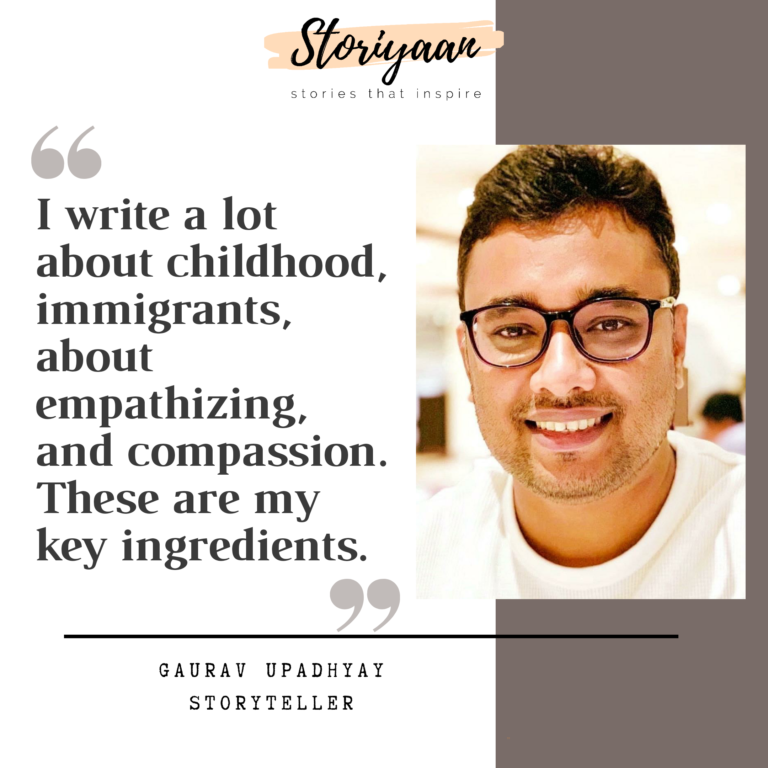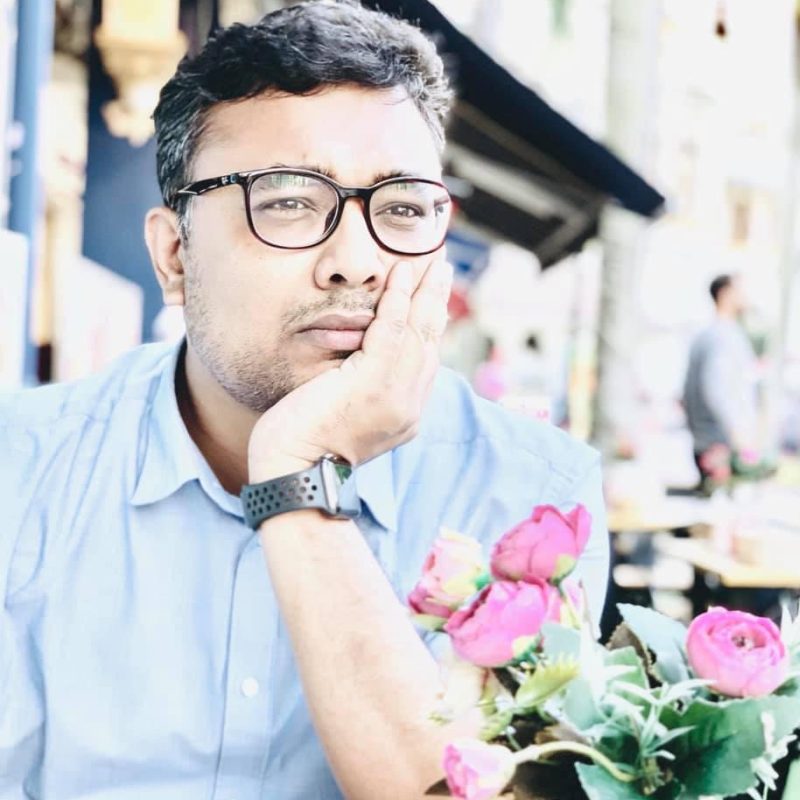A technologist by profession and a poet by heart, Gaurav Upadhyay has been living in Singapore for last 6 years. Gaurav works as a lead solution consultant at Adobe and he has been working in the field of analytics and digital transformation for last 14 yrs. Holding a management degree from MICA, Ahmedabad, Gaurav always had a passion for all things creative and related to consumer behavior. Gaurav has also mentored various digital startups.
Born and raised in Bihar , Gaurav has travelled more than 25 countries in last 15 years and he has been recently known for his published poetry book “1/2 Filter Coffee”. What started as a hobby early in his life , writing has now become a passion and Gaurav’s Filter Coffee is making round in social media with his heart touching lines and realistic poetry. His second book “Singapore Navras” is soon to be released. Adorning various facets to his personality, Gaurav talks about Hindi literature , his passion for brining impact in the society and his past struggle with anxiety , in a candid chat with Storiyaan.

Interview
Questions and answers
Tell us about your memorabilia growing up in Bihar. What challenges did you face while moving to Singapore?
I grew up in a small town called Motihari , near Patna. It is a beautiful town with a lake and green pastures. I grew up in a middle-class family with a typical Bihari culture. Cracking IIT was a dream that I was shown. I have a vivid memory of my childhood deeply rooted inside me. When I look back, I realize how it has shaped me and inspired me to become who I am today.
I then moved to Tumkur in Karnataka to pursue my engineering. I learned a lot about diversity there because of the differences in North and South Indian culture. By the end of 2014, I moved to Singapore. Career was the sole reason for me moving out. I see it as a career progression. But now that I’m here in Singapore, I have really started reflecting back and connecting the dots tin he past couple of years. That is the reason why my poetry has a lot of glimpse of a “journey of a small town boy” .
In your poem, depression 'Ek sach,' there's a line you've crafted – 'mein bikharti Rahi our suna nahi tumne.' On a personal level, why do you think people have stopped being empathetic to one another?
When I started writing, and even now, most of my themes deal with the sensitivity and insecurities that we all live with today. I have noticed that everyone has started looking for validation in everything that they do. We post pictures to show how our life is better than others or simply to show that all is good. So people have become insecure in terms of being vulnerable about who they really are. People are afraid, and insecurities have grown. This leads to a lack of transparency. The fast pace of social media has overshadowed the intricate bonds and the ability to be transparent with each other.
Being a mentor at different places, you must have come across innovative minds. What, according to you, is something unique about this generation?
One thing that I see in today’s generation is that there is a lot of search for independent Identity. Careers in photography, blogging, or even making Tik Tok videos for that matter, have increased recently. Also, because there’s potential and opportunities that you can harness now, we have become liberated in thinking jobs as an option.
When we talk about mentoring, we see many people trying to break the shackles to be different and find a unique and independent Identity.
I believe in terms of society; we will move ahead as an independent capital generating society, A society that creates job and not just seeks job.
You have overcome anxiety in the past and now help others overcome it. Can you share your experiences and challenges, and what did you learn from all of them?
I usually have a very busy schedule. My work takes me to places and requires me to travel and engage with people a lot. So a few years back, I had some health issues coming up. It went through a lot. Then after diagnosing, I came to know it was because of stress and anxiety.
The first step towards overcoming it is acceptance. looking fit and having a decent job doesn’t exempt you from having a mental illness. So I went to a psychiatrist and went through light medication for the first few months. After then, through my will power, I started making drastic changes in my lifestyle. I also took this as an opportunity to outgrow myself and help others who are suffering from the same.
Some people will say it’s all in your head and that you’re completely fine. But I found out there are so many people who suffer from it—even people from my close circle. So I proactively started talking about it. I know it may be difficult. You may feel low; you might not want to move from your bed. But you need to carry yourself up and step out. I plan to do more on creating awareness about mental health and help remove the taboo around it.
You've talked about your desire to establish yourself in the Hindi literary world. What are the steps you've taken towards your ambitions? Do you think Hindi is an underrated language in the world of literature?
I have been writing for more than a decade now. I have written and published a book last year. Another book is coming this year. I have done quite a few performances on the digital platforms and I have earned and identity on social media. The followers are growing every day. As a practice, I write Hindi daily, it is about discipline. It comes from self-reflection and observation. It’s a great realization for me as to how effective it can be used as a tool. People relate to my writings and get inspired. And about Hindi being underrated, I would say it’s under-marketed. And I think there’s no efforts taken to market it to the right audience and just trying to glorify the legacy.
Having traveled to 25 countries, what has been a critical takeaway for you? How did it impact you?
One thing that I observed is that human beings are the same. Irrespective of different countries and cultures. For example, when we were growing up in India, we used to have preconceived notions about western culture not being family-oriented. But when I traveled to the US, I noticed that some values and cultures about family and culture are so strong there. Even stronger than India in some aspects. I think when you start integrating into a different country, you’ll understand how they live how they are, and that will add values in your life, and you’ll understand how evolved you are as a person.
What were some challenges you faced while writing your first book?
The first challenge was whether I should write a Hindi book or not. There were many questions about who will read it if that will give me a different brand altogether, considering my personality contrasts with what is portrayed outside in public. Writing in Hindi is too close to me, so I had to do it. The second challenge is that being in the creative field is not as easy as it seems. The challenges are immense in terms of collaborating, getting your thoughts out, and marketing. The third challenge is that I do not stay in India. I have to position the book by targeting an audience who stay out of India and at the same time, appeal to the readers living in India. So I am happy to have made the decision not only to take a step to promote hindi writing but also to reach out to people and connect with them.
Your book "Singapore Navras" is due to release soon. Can you tell us a bit about the book, and what can we expect from it?
This is officially set to release on the 14th of September. This book is a collection of poems written by nine people who belong to the Hindi Community here in Singapore. They are the flag bearers of the Hindi language here. I was also selected as one of them. The biggest Hindi community in Singapore releases it called ,the Global Hindi Foundation. It is also encouraged and promoted by the High Commission of India here in Singapore.
According to you, which ingredient is essential for a poem to leave a trail on the mind of its readers?
I think it is to be realistic. I write a lot about childhood, immigrants, about empathizing, and compassion. These are my key ingredients. Because I think all of us, at some point, have experienced these emotions. And another thing is being simple. I want my writings to reach a lot of people and not only aristocrats. Being able to draw that imagery, and the ability to connect with simplicity is important.
You have also mentioned that you are passionate about bringing social change and entrepreneurship. What do you think?
I think it’s about saying having resources and being resourceful. If we talk about my career, then I have progressed and migrated from India to Singapore in terms of resources and capital or what I could create in terms of content or connections. So all of that has to come together to bring some impact on society. We can develop impacts in various ways. It is not necessary to be big. What is important is your execution and your intention. For instance, writing a story or poem can create an impact. It shows your intention and how resourceful you have been.
Quick 5
Describe yourself in 3 words – Observant, compassionate, and multitasker
Your favorite cuisine –Japanese
Corporate job or creative one– Creative one
Compassion or empathy – Compassion
Favorite travel destination – Tokyo.

